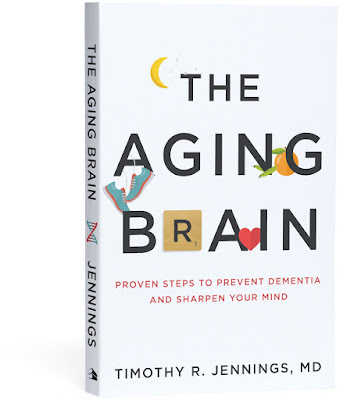The Aging Brain:
Proven Steps to Prevent Dementia and Sharpen Your Mind
Author: Timothy R. Jennings, MD
Publisher: Baker Books Grand Rapids, MI, 2018
“Why My Granddaddy Can Beat Your Granddaddy At Dominoes”
This is Tim Jennings’ third book that I’ve read. I must admit he has another winner with this one. His secret is his formula: explain the problem he’s addressing with science, then translate it for people like me with very understandable illustrations from everyday life, and then back it all up with solid research.
Timothy R. Jennings is a practicing board-certified psychiatrist, a psychopharmacologist, and much more. Oh, one more thing – he’s a practicing believer. At this point you might say, “okay, then, forget it; this book is not for me”. But wait, what if it is for you and those you love. What if a faith system does contribute to avoiding Alzheimer’s Disease and particularly, dementia?
But don’t get me wrong, that aspect of prevention and slowing down of such a condition, is not his main focus. He’s just being totally honest and providing you all the research on what does help.
I found his writing most informative and educational. For example, he explains very clearly the role of the liver in getting intoxicated. And, the role that taking care of our teeth (yes, you got that right) plays in reducing the risk of dementia.
Jennings looks at how “aging” has been viewed in history; what a healthy brain requires; and how genes are important, but they don’t have to be totally in control. He tackles many challenging aspects of life that contribute to our rapidly aging brain such as obesity, sugar intake, smoking, and alcohol. And no, he doesn’t say “it’s all bad”.
A good portion of his book is about lifestyle and aging. He starts off with the need to exercise your brain with an edict that you better “use it, or you’ll lose it”. Doing crosswords is great, but not at the expense of exercising your body – because your healthy brain needs a healthy body. He has a wonderful section on sleep which I found most informative – simple stuff that had never been explained that clearly to me before. Every reader will find themselves somewhere in there.
There’s a section in the book on “taking a weekly vacation” – yes, you read it correctly. Exercising the body/brain must be followed by resting the mind/body and only together do those two things add up to a healthier dementia-averse brain.
One of my favorite quotes from the book (because it hit me like a ton of bricks) is Jennings’ definition of Chronic Worry (an issue he tackles very extensively in the book when he deals with stress). He writes:
“In my experience treating thousands of patients over more than two decades, the worry with which the vast majority of people struggle is the worry about controlling something that is not theirs to control . . . how life will turn out and what others will think about them: Will my children grow up to be healthy and responsible adults? Will I get that job? Will my house sell? Will my spouse leave me? Will he or she like me? Did they think I sounded stupid?”
You will need to read the book to find out what he tells them and how he treats them.
There are other key sections in the book. Especially critical is the one on resolving our “mortality”. That one led meto think the following:
A lot of people know they are aging, and it bothers them. Yet many of those refuse to acknowledge that they are also dying. Mortality is an outcome of aging. You cannot have one without the other. Still, people prefer to deny and not talk about coming to the end of their life. They actually fear ‘dying’. It becomes a source of chronic stress which only brings it on faster.
Jennings makes you think and then he helps you act. The book’s last section covers Alzheimer’s Disease in considerable detail (at least what we know about it to date), what can help prevent Dementia, the risk factors and how they can be reduced, and how to care for someone with Dementia. The sections on vitamins, supplements, other things we eat or drink, and practice or feel are very extensive, complete with rationale, research, honesty on what we don’t know, and specific recommendations.
Bottom line? Jennings writes:
“Normal aging does not result in dementia. Dementia is a pathological state – an abnormal situation – a disease state that may, with healthy choices, be avoided.”
I want my grandchildren to be able to tell their friends why their grandfather can beat their grandfathers at dominoes. I’ve started following the recommendations. A must read if you care about aging.
n Ken B. Godevenos, President, Accord Resolutions Services Inc., Toronto, Ontario, January 2, 2019, www.accordconsulting.com
It would be great if you would share your thoughts or questions on this blog in the comments section below or on social media.

No comments:
Post a Comment
Thanks for your comment.